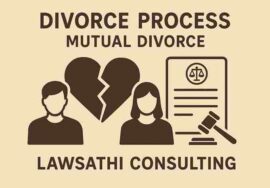Does a contract have to be in writing to be legally binding?
Let’s break this into two parts for clarity:
Answer to the question: “Does a contract have to be in writing to be legally binding?” Written contract is legally binding.
Sample simple written agreement (for Google SEO services) — so you can use it for your firm or client dealings.
🧾 1. Does a Contract Have to Be in Writing to Be Legally Binding?
✅ Short Answer:
No — under the Indian Contract Act, 1872, a contract does not have to be in writing to be legally binding.
A verbal/oral contract is also valid if it fulfills all essential elements of a contract under Section 10 of the Act:
“All agreements are contracts if they are made by the free consent of parties competent to contract, for a lawful consideration and with a lawful object, and are not hereby expressly declared to be void.”
However, in practical and legal terms, written contracts are always stronger evidence — especially for service-based agreements like Google SEO, where deliverables, payment terms, and timelines must be clearly defined.
So:
✔️ Oral contract = Legally valid, but hard to prove.
✔️ Written contract = Strong, enforceable, and clear evidence of terms.
📃 2. Sample Agreement for Google SEO Services
This is a simple template you can customize for your legal or business use.
SEO SERVICE AGREEMENT
This Agreement is made on this _ day of , 20,
Between
(1) [Client Name], having its office at [Address], hereinafter referred to as the “Client”,
AND
(2) [Service Provider Name], carrying on business under the name [Your Firm, having its office at [Address], hereinafter referred to as the “Service Provider.”
- Scope of Work
The Service Provider agrees to perform Search Engine Optimization (SEO) services for the Client, including but not limited to:
Keyword research and optimization
On-page and off-page SEO activities
Local SEO (Google My Business optimization)
Monthly reporting and analytics
- Duration
This Agreement shall commence on [Start Date] and remain in effect for a period of [X months], unless terminated earlier under Clause 7.
- Fees and Payment Terms
The Client agrees to pay a total service fee of ₹[Amount] per month.
Payment shall be made within 7 days of invoice submission.
Any delay in payment beyond 15 days shall attract a late fee of 2% per month.
- Responsibilities of the Parties
The Service Provider shall use ethical SEO practices and follow Google Webmaster Guidelines.
The Client shall provide timely access to its website, analytics, and relevant content.
5. Confidentiality
Both parties agree to keep all project-related information strictly confidential and not to disclose any proprietary data to third parties.
- Limitation of Liability
The Service Provider shall not be liable for any loss of business, revenue, or goodwill arising from:
Changes in search engine algorithms; or
Actions taken by third-party platforms (e.g., Google, Bing).
- Termination
Either party may terminate this Agreement by giving 30 days’ written notice.
All dues up to the date of termination shall be paid immediately.
- Governing Law and Jurisdiction
This Agreement shall be governed by and construed in accordance with the laws of India, and courts at Delhi shall have exclusive jurisdiction.
- Entire Agreement
This Agreement constitutes the entire understanding between the parties and supersedes all prior communications, oral or written.
IN WITNESS WHEREOF, the parties hereto have executed this Agreement on the date first above written.
Service Provider Client
Signature: Signature:
Name: _____ Name: _____
Date: _____ Date: _____
📌 Tip for SEO Contract Enforcement:
Even though oral contracts are legally valid, always keep your SEO agreement in writing, with clear:
Scope of work
Deliverables
Timelines
Payment schedule
Termination clause
This protects both the service provider and the client and ensures transparency. Written contract is legally binding.
Disclaimer: This article is for educational and informational purposes only. It provides a general understanding of legal remedies but does not constitute legal advice. For specific legal guidance, you can consult a legal expert.







